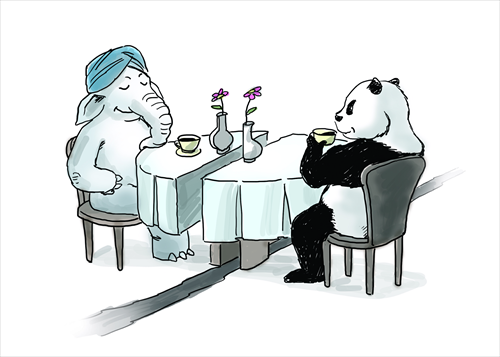HOME >> OP-ED
Border issue may still poison Sino-Indian ties
By Wu Zhaoli Source:Global Times Published: 2014-4-17 20:23:01

Illustration: Liu Rui/GT
The Henderson Brooks Report is an investigative report compiled by the Indian government examining the country's defeat in the 1962 border war with China. Though no longer confidential, it is still classified top secret by New Delhi.
In the past, the Congress party once covered up the reality about the border contention with China, distorted the history and misled the general public, in a bid to safeguard its position as the ruling party as well as the moral and just image of India in the international community.
Now the government is still attempting to conceal the contents of the report, citing its contents "are not only extremely sensitive but are of current operational value."
Indeed, the Sino-Indian border dispute is not only a key issue in their bilateral relations, but also an extremely sensitive topic in India's political circle.
India's military debacle once plunged the Congress party led by then prime minister Jawaharlal Nehru into unprecedented pressure and crisis.
Currently with the 16th Lok Sabha elections in full gear, Sino-Indian relations, and in particular the border dispute, may become a hot political issue even though foreign policy issues are often marginalized in Indian general elections.
The Congress-led United Progressive Alliance government has met vehement condemnation in its second term for sluggish economic growth, prohibitive inflation rate and flawed anti-corruption policies.
The Bharatiya Janata Party (BJP) has criticized the incumbent government for refusing to declassify the report, in an attempt to promote its own influence and quell the arrogance of the Congress party.
Indian media outlets and public opinion also tend to perceive Sino-Indian relations through the prism of the border conflict of more than 50 years ago.
The border row has long been agitating China-India bilateral ties, but what is reassuring is that the two nations have already achieved fruitful results in this connection during the past more than three decades, including an agreement based on common consensus in 2005, two important negotiation mechanisms in 2003 and 2012 respectively, and three border pacts in 1993, 1996 and 2013.
It is fair to say that Beijing and New Delhi have made remarkable breakthroughs in addressing the perplexing border dispute.
Despite the periodical deliverables in border negotiations, the issue has yet to be resolved in a rational way, wielding substantial influence upon the further development of Sino-Indian ties.
Indian people remain divided regarding whether China is a threat or a partner. The protracted contention has impacted India's judgment of Beijing's policies and conduct, leading to restricted political and strategic mutual trust toward China.
New Delhi is also concerned that the dangling dispute might negatively affect its economic and trading ties with Beijing.
In addition, the issue will probably damage the images of both Indians and Chinese on each side.
Other conundrums like the trade imbalance, competition over water resources, and China's relations with other South Asian nations also constitute practical obstacles in the bilateral relations between the two neighbors.
Future China-India ties will be fraught with both opportunities and challenges. Since 1988, Chinese premiers and Indian prime ministers have engaged in several mutual visits and sealed a series of agreements on bilateral ties that stipulate basic rules governing the development of their relations and define principles for resolutions to disputes. All these have established the keynote of the future development of the two nations.
Nevertheless, China-India relations are bound to experience challenges in the future given public understanding of the border dispute, limited people-to-people exchanges, convergence and collision of strategic interests between the two countries, and the changing regional and international tapestry.
Chinese Premier Li Keqiang chose India as his destination in his maiden foreign tour in May 2013, underlying that China and India are "natural partners" and that developing ties with India is a key direction of China's diplomatic endeavor.
In October when Indian Prime Minister Manmohan Singh made his second visit to Beijing, he said, "Our relationship with China occupies a very high priority in India's foreign policy."
Objectively speaking, leaders of the two states have fundamental common consensus on developing and deepening their bilateral relations, but need to make more efforts to beef up political and strategic mutual trust.
To this end, China and India should devote more time to effectively operating cooperation and dialogue mechanisms and meanwhile properly managing disputes, notably the border issue.
The author is an assistant research fellow with the National Institute of International Strategy, Chinese Academy of Social Sciences. opinion@globaltimes.com.cn
Posted in: Viewpoint